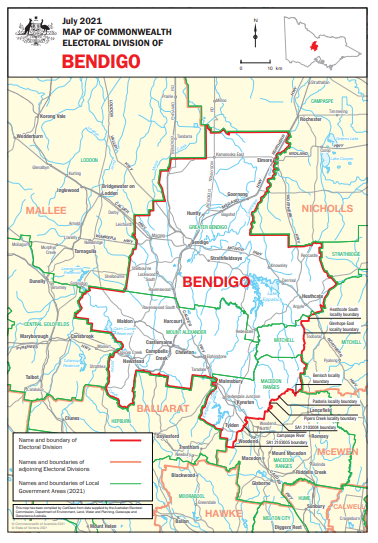|
|
|
|
| Adam Carr's Election Archive
|
Australian federal election, 2022
Division of Bendigo, Victoria
Named for: City of Bendigo (the site of the city was originally
called Bendigo's Creek, named for a local prize-fighter whose
nickname Bendigo was derived from the English boxer William Abednigo
Thompson (1811-80), known as Bendigo.)
Central Victoria: Bendigo, Castlemaine, Heathcote, Kyneton, Maldon
State seats: All of
Bendigo West, parts of
Bendigo East,
Euroa and
Macedon
Local government areas: All of
Greater Bendigo and
Mount Alexander, parts of
Macedon Ranges and
Mitchell
Borders with:
Ballarat,
McEwen,
Mallee and
Nicholls
Enrolment at 2019 election: 112,755
Enrolment at 2022 election: 112,498 (-00.2)
1999 republic referendum: No 61.8
2018 same-sex marriage survey: Yes 68.7
Sitting member: Lisa Chesters (Labor):
Elected 2013, 2016, 2019
2007 Labor majority over Liberal: 6.1%
2010 Labor majority over Liberal: 9.5%
2013 Labor majority over Liberal: 1.3%
2016 Labor majority over Liberal: 3.7%
2019 Labor majority over Liberal: 9.0%
2022 National Labor majority over Liberal: 9.0%
Liberal two-party vote 1983-2019
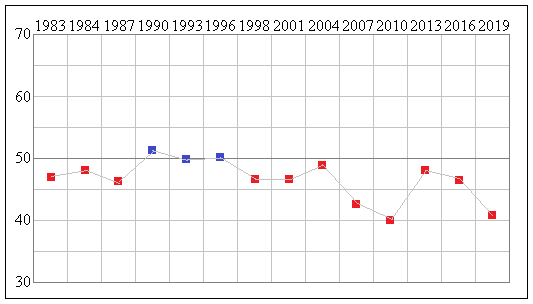
Status: Fairly safe Labor
Best Labor booths, two-party vote: Castlemaine North (82.9), Winters Flat (78.7), Chewton (78.3), Guildford (77.3),
Castlemaine (77.1)
Best Liberal booths, two-party vote: Elmore (59.2), Axedale (55.7), Junortoun (55.6), Redesdale (54.6), Goornong (50.5)
2019 results
Statistics and history
Candidates in ballot-paper order:
 |
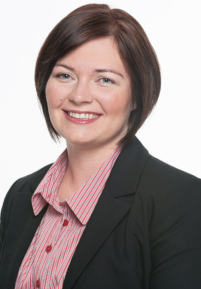 |
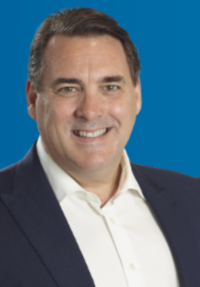 |
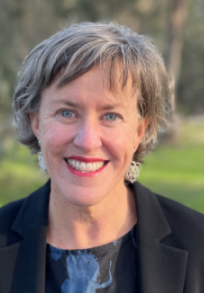 |
1. James Laurie
Independent |
2. Lisa Chesters
Australian Labor Party |
3. Darin Schade
Liberal Party |
4. Cate Sinclair
Australian Greens |
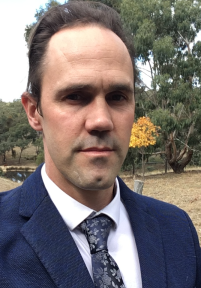 |
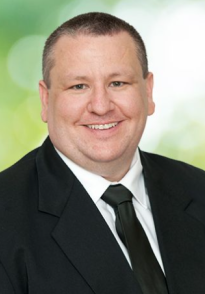 |
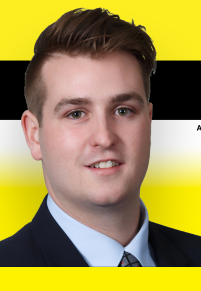 |
5. Matt Bansemer
Liberal Democrats |
6. Ben Mihail
Pauline Hanson's One Nation |
7. Elijah Suares
United Australia Party |
Candidate websites:
Matthew Bansemer
Lisa Chesters
Ben Mihail
Darin Schade
Cate Sinclair
Elijah Suares
Division of Bendigo
Bendigo has existed since Federation and has always occupied a block of territory in central Victoria around the historic
goldfields city. Like most country seats, it combines a fairly low income level with a very low proportion of people
born in non English speaking countries. From 1937 to 1949 it included Echuca and the Murray Valley and was a safe
Country Party seat, but for the rest of its history it has been politically marginal.
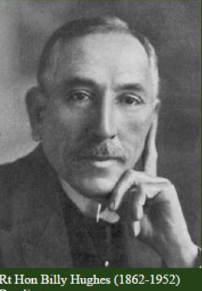 In recent times the seat has been trending towards Labor as the area is colonised by wealthy professionals from
Melbourne: even in the Liberal landslide year of 1996, the Liberal majority was less than 1%. Labor's strength lies
in the city of Bendigo and also in Castlemaine. The Liberals win most of the smaller rural booths.
In recent times the seat has been trending towards Labor as the area is colonised by wealthy professionals from
Melbourne: even in the Liberal landslide year of 1996, the Liberal majority was less than 1%. Labor's strength lies
in the city of Bendigo and also in Castlemaine. The Liberals win most of the smaller rural booths.
Bendigo's most distinguished member was Nationalist Prime Minister
Billy Hughes, who held the seat from 1917 to 1922
before moving back to Sydney.
John Brumby, later Premier of Victoria, held Bendigo for Labor from 1983 to 1990.
Steve Gibbons won the seat for Labor in 1998 and held it until his retirement in 2013, although he had a close call in
2004.
Lisa Chesters, Labor MP for Bendigo since 2013, was an organiser with the left-wing union United Voice for ten years before her
election. At the 2013 election she survived a sharp swing to the Liberals, but this ground was partly recoverted in
2016. Chesters was a shadow assistant minister 2016-19, but returned to the back bench after the 2019 election.
With a majority of 3.7% in 2016 this was still a marginal seat, but a further swing to Labor in 2019 put the seat into the
"fairly safe Labor" category. It is now 25 years since the Liberals won this seat. Like the rest of central Victoria, it
has become increasingly solid for Labor at state and federal level. The 2021 redistribution removed Woodend at the southern
end of the seat but left it politically unchanged. The Liberal candidate is Darin Schade, a financial consultant who was born
in Bendigo but lives in Melbourne. The Greens candidate is Cate Sinclair, a public health practitioner.
Demographics:
Median weekly household income: $1,188 (Australia $1,438)
People over 65: 18.9% (Australia 15.8%)
Australian born: 82.9% (Australia 66.7%)
Non-English-speaking households: 5.5% (Australia 22.2%)
Catholics 20.8% (Australia 22.6%)
No religion 37.6% (Australia 29.6%)
University graduates: 18.3% (Australia 22.0%)
Professional and managerial employment: 33.3% (Australia 35.2%)
Employed in manufacturing and construction: 27.7% (Australia 22.9%)
Employed in agriculture: 4.3% (Australia 3.3%)
Paying a mortgage: 36.0% (Australia 34.5%)
Renting: 25.0% (Australia 30.9%)
Traditional families: 27.9% (Australia 32.8%)
Back to main page
|
|
 In recent times the seat has been trending towards Labor as the area is colonised by wealthy professionals from
Melbourne: even in the Liberal landslide year of 1996, the Liberal majority was less than 1%. Labor's strength lies
in the city of Bendigo and also in Castlemaine. The Liberals win most of the smaller rural booths.
In recent times the seat has been trending towards Labor as the area is colonised by wealthy professionals from
Melbourne: even in the Liberal landslide year of 1996, the Liberal majority was less than 1%. Labor's strength lies
in the city of Bendigo and also in Castlemaine. The Liberals win most of the smaller rural booths. 
